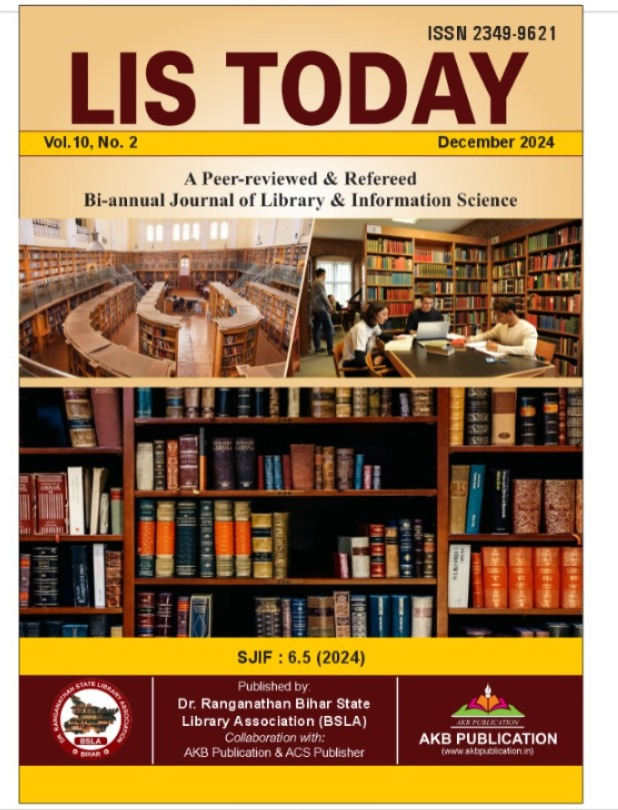Ethics and Guideline
Ethics and Malpractice
LIS TODAY is dedicated to maintaining the highest ethical standards in publishing, strictly adhering to the guidelines set by the Committee on Publication Ethics (COPE). We expect all authors, editors, reviewers, and the publisher to follow these ethical principles to ensure the integrity and quality of the publication process.
1. Publication Ethics
- Originality: Manuscripts submitted to LIS Today must be original and not previously published or under consideration elsewhere. Plagiarism or any form of unethical publishing behavior is unacceptable. All manuscripts are screened for plagiarism using reliable detection software.
- Authorship: Only individuals who have made significant contributions to the research should be listed as authors. Others who have contributed to specific aspects of the research should be acknowledged. Any changes to authorship after submission must be agreed upon by all authors and communicated to the editorial board.
- Conflicts of Interest: Authors, reviewers, and editors must disclose any financial or non-financial conflicts of interest that could influence the research, review, or editorial decisions.
- Data Accuracy: Authors are responsible for the accuracy and reliability of the data presented. All data should be free of manipulation or fabrication, and supporting information should be made available upon request for verification.
- Ethical Approval: If the research involves human or animal subjects, authors must ensure the research adheres to ethical standards, including obtaining appropriate approval from ethics committees or institutional review boards (IRB).
2. Peer Review Process
- Double-Blind Review: LIS Today uses a double-blind peer review process to ensure an impartial evaluation of all manuscripts. Both the reviewers and authors remain anonymous throughout the review process.
- Reviewers’ Responsibilities: Reviewers are expected to provide fair, objective, and constructive feedback within the allotted time frame. They should assess the manuscript’s originality, validity, and relevance to the journal’s scope. Reviewers must also disclose any conflicts of interest and maintain the confidentiality of the manuscripts they review.
- Confidentiality: All information related to the manuscript is kept confidential and not shared with anyone outside the review process.
- Decision Making: Based on the reviewers' feedback, the editorial board makes the final decision on the acceptance, revision, or rejection of the manuscript.
3. Corrections and Erratum
- Corrections: If an error that affects the accuracy of a published paper is identified, authors are required to notify the editorial board. Corrections will be published in subsequent issues to amend errors that do not alter the findings or conclusions.
- Erratum: Minor errors (e.g., typographical or formatting mistakes) will be corrected by issuing an Erratum in the next available issue.
- Retractions: In cases of severe ethical violations, including plagiarism or data falsification, LIS Today reserves the right to retract the published paper. A retraction notice will be issued and marked as retracted in all online and print versions.
4. Misconduct and Ethical Violations
- Plagiarism and Fabrication: All forms of plagiarism, including self-plagiarism, and any form of data fabrication or manipulation are strictly prohibited. Manuscripts found to violate these standards will be rejected or retracted.
- Handling Allegations: Allegations of misconduct are handled in accordance with COPE guidelines. Investigations will be conducted by the editorial board, and appropriate action, such as rejection or retraction, will be taken if misconduct is confirmed.
- Right to Appeal: Authors have the right to appeal editorial decisions. Appeals must be based on scientific merit and justified with additional data or explanations for reconsideration.
5. Transparency and Openness
- Data Sharing: Authors are encouraged to share their data and make it publicly accessible whenever possible, promoting transparency and reproducibility in research.
- Open Access Policy: LIS Today is an open-access journal, ensuring that its content is freely available to researchers, professionals, and the public, supporting the global exchange of knowledge.
6. Adherence to COPE Guidelines
- LIS Today strictly follows the ethical standards set by the Committee on Publication Ethics (COPE). In cases of disputes or ethical concerns, COPE's Core Practices are followed to investigate and resolve issues, ensuring that the journal adheres to international best practices in scholarly publishing.

